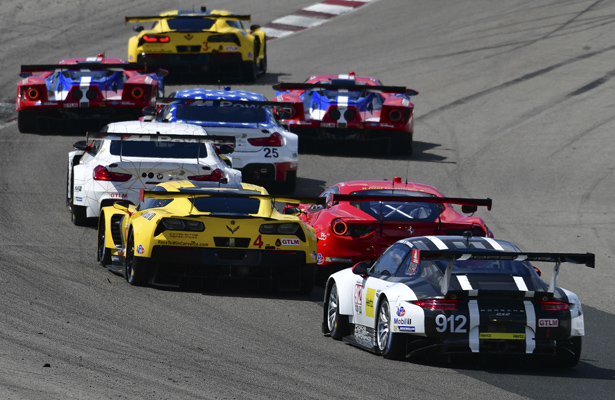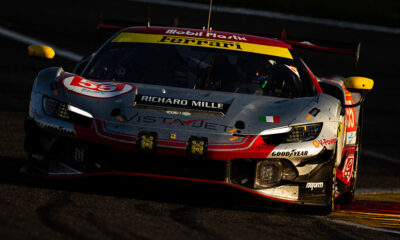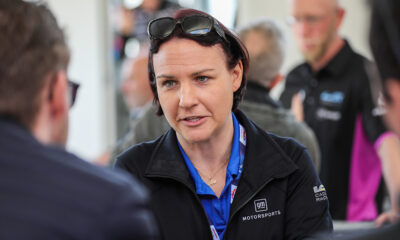
Photo: IMSA
After a failed attempt to unify the platforms more than two years ago, GT convergence talks could be set to resume later this summer, in reaction to the FIA’s proposal for a GT World Championship.
Sportscar365 has learned that multiple manufacturers are looking to propose a resumption of talks, aimed to eventually deliver a common set of GT regulations for sports car racing championships worldwide.
Initial talks to merge the current GTE and GT3 regulations into a single platform broke down in 2014 at the 11th hour, in a discrepancy over the method of air restrictors utilized.
Now, with the a majority of manufacturers either having already transitioned to or moving towards turbocharged engines, which do not utilize sonic air restrictors, as well as increasing similarities between the two current platforms, the FIA has begun exploring the resumption of GT convergence.
“I have big hopes that we can properly restart GT convergence. And I think it’s already happening,” BMW Motorsport Director Jens Marquardt told Sportscar365.
Marquardt is among the proponents for the resumption of talks, after being approached by FIA President Jean Todt on his thoughts of a GT World Championship, utilizing GT3 cars with increased performance levels.
The proposal for the championship, which would be separate from the FIA World Endurance Championship, has been floated to multiple GT manufacturers since March, but Marquardt doesn’t believe it would work under the current split GTE/GT3 formula.
“I said to Jean Todt that I think it’s more important to sort the GT classes out first, then think about championships rather than the other way around,” he said.
“[We] can’t set up a works platform on a customer race car and mess the whole thing up… I think we have to be very careful not to destroy customer racing.”
Instead, developing factory and customer-based car packages on a common platform , similar to the previously proposed GT+ and GT concepts, would keep both markets sustainable, he said.
“I think that’s where the approach with the convergence comes from, that you have one platform, you put development effort into that,” Marquardt said.
“You can then do a works-level where you can spend a bit more money on performance and engine and aero-wise. But what customers really need is an efficient program in regards to running costs.
“If you have the development properly shared, that can benefit from the reliability and everything from that massively. You can [then] hand over your efficiency to your customers, which I think is the smartest thing.”
Other manufacturers are in agreement that convergence could now become a reality, particularly with the evolution of both current platforms, which have melded together in some key technical aspects.
The new-for-2016 Ferrari 488 GTE and GT3 cars, for example, share a majority of common parts, while BMW has developed its IMSA-homologated M6 GTLM directly from the GT3 car, complete with the same production-based drivetrain.
“The differences between GT3 and GTE cars are no longer that big,” Head of Porsche Motorsport Dr. Frank-Steffen Walliser told Sportscar365.
“With all the data and tools technicians we have nowadays, it should be possible to balance the cars.
“We definitively need a platform for customer teams and amateur drivers. How to differentiate is part of the ongoing talks.”
Corvette Racing program manager Doug Fehan is also supportive of the resumption of discussions but is not certain it would lead to a different result from when talks broke down two years ago.
“I think it’s always been the objective of the organizers to come up with a common set of rules,” he told Sportscar365. “Various attempts have been made in the past and we’ve come reasonably close to achieving that.
“Each time, something has arisen that has prevented it from taking place. That doesn’t mean that efforts still shouldn’t be made to try and achieve the goal.
“It makes a huge amount of sense to me to do it but there’s just so many moving parts, it’s just a very difficult target to hit.”
According to a report from German publication Auto Motor und Sport, FIA GT Commission President Christian Schacht has been on a fact-finding mission to determine whether GT convergence should be restarted, having reached out to individual manufacturers in recent months.
It’s believed a proposal for the resumption of talks could be made by the end of this month, although no definitive timeline has been determined.
No changes to the current regulations would be expected until 2018 or 2019 at the very earliest, or possibly later.
Should an agreement be put into place by then, it could fit into the timeline for the proposed FIA GT World Championship, which is understood to still be in the preliminary stages of discussion.
While Todt has been pushing for a new standalone championship, WEC boss Gerard Neveu and ACO President Pierre Fillon are hopeful of having the GT World title awarded to its GTE-Pro category instead, alongside the World Championship currently awarded to LMP1 drivers and manufacturers.
“Currently we have four to five manufacturers in GTE racing, more than in other world championships,” Porsche’s Walliser added. “We will have to discuss about the perfect format but I think currently WEC shows very attractive motorsport.”
The common theme among manufacturers has been their fear of a new factory driven championship threatening the current worldwide success of GT3, which was initially constructed for customer racing.
“Right now, the level in GT3, where the pro drivers are allowed, is really high,” Head of Lamborghini Motorsport Giorgio Sanna told Sportscar365.
“There is less space for real customer programs and gentlemen drivers. In my opinion, that’s a problem. GT3 is born for a Pro-Am category.
“In my opinion, it’s better to have one high-level series that could be interesting for somebody that’s trying to have the maximum exposure, but to maintain sporting rules that gives access to the real customers.”
Click Here to read more insight into the proposed GT World Championship from Auto Motor und Sport (in German).























